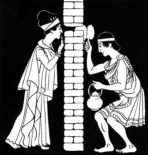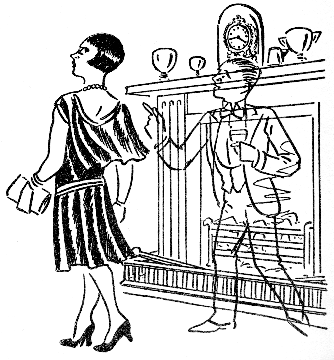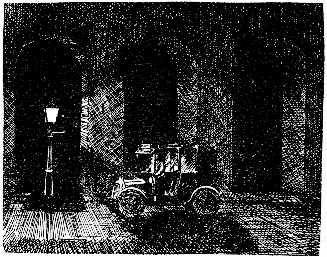
|
Anti-Woo
Stephen Potter |
Warnings for Women
On First Signs of Woo: Indistinctness a Danger Signal
Here we plunge straight into a major contra-indication of woo, and one which divides the sexes with a scimitar. Men quite like to meet men and women who are indistinct in character. It gives them confidence. But women, unless they are dyed in the grain maternalists, do not like it, and should regard vagueness as a major contra-indication.
An exaggerated instance of this is young Cuffey, of whom it is inaccurate to say that women found him difficult even to see because in fact he was to them, to start with, completely invisible. Even at quite a small drink gathering, Cuffey was never noticed. When a fine young woman passed him or indeed when she was introduced to him it was like a wave breaking over his head. He almost immediately found himself obliterated in the trough of her wake, forgotten and unnoticed. By the time he had said ‘haven’t we met before’ this great beacon of a girl was already in the middle of a new group.

‘Talking to yourself?’ said Coad. Coad and I were inclined to slap Cuffey teasingly on the back.
‘You must be more definite,’ I said. ‘Say “Weren’t you the girl who was elected Reine des Fleurs at Le Touquet?”’ The girl will like this, especially as she has never been nearer to France than Angmering. Try it. ‘Weren’t you the girl...’
Cuffey is quiet but he is persistent. And 18 months after this advice, and after practising this phrase and getting quite good tuition on the unidiomatic ‘Reine des Fleurs’ he found himself one day in Victoria Station, in a Crystal Palace train, sitting opposite a girl so appallingly pretty, with mobile soft lower lip, thick locks of chestnut hair falling to her skoulders, and eyes lowered to display toothbrush-thick eyelashes, that Cuffey determined at once to put his phrase into operation.
Unfortunately, while he was having one silent run-through, a woman, obviously the girl’s mother, came in and sat down beside the girl and started talking. Nevertheless it did seem to Cuffey that the girl had glanced at him. And, listening to their conversation, he heard Eyelash tell her mother that she was going to have a golf lesson at the Merton Golf Club on the following Monday.
Cuffey had not heard of this Club, but he turned up that morning, and after walking sideways towards Eyelash, with a strange gait, he yet made his recommended remark (stumbling a little over ‘weren’t you the girl’ – he said ‘wasn t’) and we were all glad to hear it was a complete success, and well followed up by Cuffey, who achieved a meeting at the Piccadilly Hotel, where he had once seen the words ‘dinner-dance’ advertised in the lobby.
All this was in Cuffey’s earliest years – date, about 1920, when the phrase ‘dinner-dance’ had remarkable prestige. But nothing can soften the hard facts of the sequel, the sequence of which was fully confessed by Cuffey two years later. The dinner had gone well, until the actual paying of the bill, which Cuffey for some reason asked for by saying in a high clear voice ‘Can I have the bill, please,’ which of course was not too good. Then, as he later told us, in the taxi to Hammersmith, Eyelash looked more anguishingly pretty than ever. His mother wouldn’t have approved of all that make-up. Had she intensified it when she got her cloak? Tremendously, he believed. It frightened him. His heart sank. The taxi would have to dodder along for twenty minutes before it reached Carlyon Road, Hammersmith. Silence fell. Now, he knew, we all would say that he ought to kiss her. He wanted to kiss her. Surely she would – he had almost said ‘should’ to himself, and even that ghost of a caddish thought made him despise himself, and lowered the temperature. Where now was his confident gaiety which he had been able to assume when he said ‘Weren’t you the girl?’ Horrors – the gloomy arches of Olympia, all lights out, were already approaching. Now he must say it – ‘Will you kiss me?’
Why was she disappearing, as it were, down some long corridor? What had happened? What was it? Where was he? Where was she?

Stephen Potter, Anti-Woo, 1965